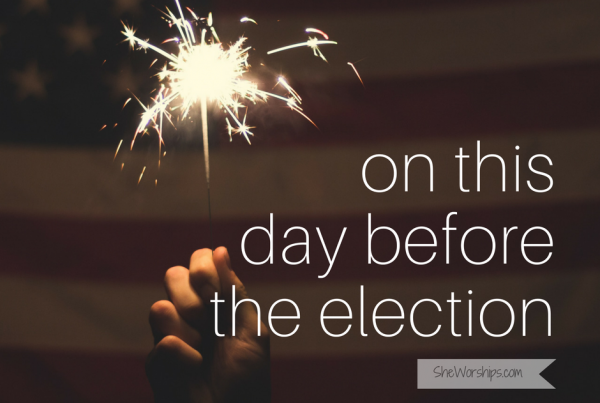Today my heart is overcome with joy for my African-American brothers and sisters. Whether or not you agree with the policies of President-elect Barack Obama, one thing is for sure–yesterday’s election was a monumental moment in our nation’s history. It brought us one step closer to healing the wounds our nation has inflicted upon African-Americans throughout our history. And for that, I am deeply grateful.
Having said that, there is a language about Presidential elections that I find a bit worrying: this language of “hope.” We’ve heard it a lot in reference to both McCain and Obama, but I was particularly struck by it last night when I heard Oprah make the following statement during an interview,
“With Obama’s election, we can finally have hope in this country.”
(Interestingly, she then proceeded to cite some Scripture. It would seem that her theology and her politics are getting a bit conflated.)
Now as theologically problematic as I found her comments to be, I have to admit that I sympathize with Oprah’s position. There have been many moments in America’s history when we (Christians included) have stolen away hope from our nation’s minorities. And given that history, Obama’s election signals the beginning of a new era for African-Americans, an era that seems far less hopeless and impossible than it did before.
However, we must also be cautious about such language. Why? Because there is a temptation to speak about our political leaders using words that mirror Scriptural language about Christ.
If a person does not know Christ, then such language of promise, expectation and everlasting hope is to be expected, but it is not the kind of language or ideology that disciples of Christ should be espousing.
It is for that reason that we must continually ask ourselves the following crucial question, a question which quickly diagnoses the state of our hearts:
“Who is your king?”
Like the Israelites in 1 Samuel 8, we are constantly faced with choosing between an earthly king or a heavenly One. That is why the language we use for Christ is so frequently co-opted to describe worldly leaders. There is a very real temptation there. What’s more, there are many, many kings to choose from…some not as obvious as you may think.
The way we talk about our politicians and our pastors can reveal the identity of our true king. Yet the king of your heart will not always necessarily be a person. When we are enslaved to popularity, success, body image–these can just as easily set up monarchies in our hearts.
The way you live, what drives you, what you center your life around–all these things reveal the identity of your true king. And that is why you must constantly ask yourself “Who is my king?” When someone looks at your life and listens to your words, which king would they suppose you follow?
We must ask ourselves that question every day, not simply this week. The Presidential election may highlight this spiritual issue more clearly, but the reality is that we submit ourselves to earthly rulers every single day.
Live the kind of daily life that would lend an obvious answer if someone were to ask: “Who is your king?” Not only are your freedom and joy at stake, but the reputation of the True King as well.






I wish I had known about this blog 4 years ago. This post is awesome simply because it draws the line between being happy about Obama’s role in America a black man, and his politics. This distinction was soo needed at my church following the election–hurtful and inflammatory comments were made about African Americans on Facebook by some of the youth in the larger fellowship. I cried for days. The rift still persists 4 years later though the elders openly addressed it with the young people. No one seemed to understand how we (as blacks) could be happy to see a “familiar face” in the Oval Office, despite the discomfort with some policies. We were lambasted and told to “get over” discrimination. SO HARD. Thank you for engaging in an intelligent discussion about this. Sorry I’m a little late! Lol.